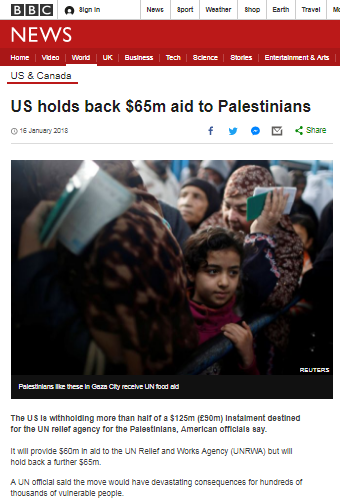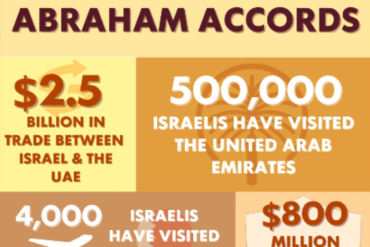The February 6th edition of the BBC Two and BBC World News programme ‘Hardtalk’ featured presenter Stephen Sackur interviewing the British Foreign Secretary William Hague.
Most of the programme (which can be seen here) was dedicated to the subjects of Syria and to a lesser extent Afghanistan, but a segment towards the end related to what Sackur described as “important policy areas” and termed “Israel-Palestine”.
That particular part of the programme was also aired separately on BBC News programmes and was in addition promoted on the BBC News website’s Middle East page.
[youtube=http://www.youtube.com/watch?v=SC8-8LNoftM]
Sackur opened:
“The Americans, it seems, are going to publish their vision – their plan – for a two-state solution very soon. In getting ready for that, John Kerry warned the Israelis that if they reject this push for peace, he said, it is going to intensify calls for the isolation, for a boycott upon the Jewish state – upon Israel. Do you echo those sentiments? Do you see Israel’s isolation becoming more complete?”
William Hague: “Ah..he’s right to warn about that and I have warned Israeli leaders as well as Palestinians that much of the world will see this as the last chance at a two-state solution. You know, if John Kerry – and I really pay tribute to John Kerry and to the energy and the commitment that he has put into this – and many observers will say, if it doesn’t work – that if John Kerry with all of the weight of the United States, all his experience and standing in the Middle East and the world – cannot bring the two sides together to reach final status agreements, then who can?
SS: “But in talking of isolation of Israel, Kerry put Israeli government ministers’ backs up. One – Yuval Steinitz who was on my programme recently – he said in response to Kerry’s words: ‘Kerry is holding a gun to Israel’s head’. Is the EU, with its own boycott of Israeli businesses that have operations in occupied territory, is the EU putting a gun to Israel’s head?”
WH: “We don’t – just to be clear – we don’t have boycotts; we have guidelines.”
SS: “But you’re blocking loans and grants to….”
WH: “That is a different thing from a boycott. We’re not putting a gun…nobody is putting a gun to anybody’s head. In fact what the EU is offering is an unprecedented package of economic partnership and assistance to work with Israelis and Palestinians if this is successful. There is a real positive…”
SS: “And if it’s not? That’s the question: if it isn’t going to go further..”
WH: “If it isn’t, that can’t take place. And if it doesn’t happen, if there isn’t an agreement on these things, then I think it will be a very dark time both for Israelis and for Palestinians – for both sides actually. There are terrible consequences to fear. And certainly it would bring a great deal of international pressure on Israel, including at the United Nations and there’ve been many moves for Palestinians to seek greater recognition at the UN which would command a huge amount of international support. That is evident from previous votes. Britain hasn’t committed itself on that but…
SS: “But if we’re painting that scenario – exactly – if we’re painting that scenario…”
WH: “It would be difficult for Israel but it would be difficult for Palestinians as well because without embracing a two-state solution, their situation would be pretty desperate as well.”
As we see, not only did Sackur provide a platform for the promotion (and subsequent BBC amplification) of Hague’s blatant ‘nice country you’ve got there; would be a pity if anything happened to it’ tactics, but he failed utterly to clarify to viewers that Hague’s presentation of the issue as though it were all down to what the parties involved want to do – rather than what they are currently capable of doing – is plainly ridiculous.
Viewers were at no point made aware of the fact that the party negotiating on behalf of the Palestinians does not include the faction – Hamas – which secured the largest number of votes in the last PLC elections. They were not told that the current president of the Palestinian Authority lacks the authority or the ability to sign any agreement seeing as his term of office expired over five years ago and elections are long overdue and currently impossible to carry out. Neither was it made clear that the Palestinian Authority has no control whatsoever over the Gaza Strip – one of two areas projected to become part of a future Palestinian state – and Sackur avoided asking Hague how any signed peace agreement could possibly be implemented in an area ruled by a third-party terrorist group which categorically rejects the two-state solution, is committed to the destruction of one party to any potential agreement and has a significant presence (along with additional rejectionist terrorist groups) in the area which is controlled at present by the Palestinian Authority.
But Hague also got off scot-free with regard to other issues. Sackur failed to challenge him on the subject of UK government and EU funding for organisations and NGOs which promote, support and operate the BDS movement against Israel. He failed to demand accountability from Hague regarding the doublespeak of a UK government which claims in public to be opposed to any boycott of Israel and yet, for example, funds the British Council and Arts Council England – both of which have in turn funded the BDS supporting, anti-two-state solution project known as the PalFest. Neither did he solicit a response from Hague with regard to the recent claim published in an Israeli newspaper according to which a senior British diplomat told a reporter “It’s my job to f*** settlement factories like this one in Ein Gedi”.
Sackur also conveniently refrained from dissecting Hague’s cringingly transparent ‘equality’ chimera of EU or UK censure of the Palestinian Authority (the same body which was recently revealed to be holding explosives and weapons in a diplomatic mission on EU soil) should peace negotiations collapse. After all, as past experience shows, even when the PA actively sabotaged the Oslo Agreements by initiating and financing an unprecedented campaign of terror against Israeli civilians in 2000, the EU continued to fund that body and even raised its contributions to the tune of an annual average of 250 million Euros. Hence, there is little reason to anticipate an about-face this time around and just as little reason to anticipate any letting-up in EU and UK funding of anti-Israel NGOs or an end to the practice of paternalistic, diplomatically illiterate finger-wagging from the hand which still feeds sections of the BBC.
Palestinian Authority (the same body which was recently revealed to be holding explosives and weapons in a diplomatic mission on EU soil) should peace negotiations collapse. After all, as past experience shows, even when the PA actively sabotaged the Oslo Agreements by initiating and financing an unprecedented campaign of terror against Israeli civilians in 2000, the EU continued to fund that body and even raised its contributions to the tune of an annual average of 250 million Euros. Hence, there is little reason to anticipate an about-face this time around and just as little reason to anticipate any letting-up in EU and UK funding of anti-Israel NGOs or an end to the practice of paternalistic, diplomatically illiterate finger-wagging from the hand which still feeds sections of the BBC.
Thanks to Sackur’s ineffectual performance, the licence fee paying public remained oblivious both to the existence of many objective factors which make the culmination of the current talks in a workable agreement extremely unlikely and to the redundancy of the FCO’s pompously simplistic approach to such a serious and complex subject.
So much for the BBC’s obligation to “[e]nhance UK audiences’ awareness and understanding of international issues” – and journalistic independence.





